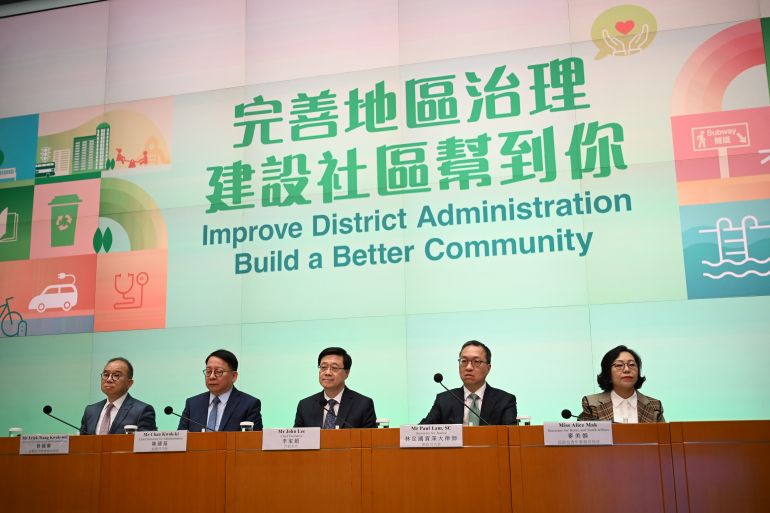Hong Kong reduces directly-elected seats in district polls
The latest changes are part of an effort to ensure only ‘patriots’ hold political office in the territory.

Hong Kong has cut the number of directly-elected seats in its local district councils in the latest part of an effort to ensure only “patriots” are able to hold political office in the territory.
Under the changes announced by Chief Executive John Lee, 80 percent of seats will be filled by people appointed by the government and all candidates will need to be vetted.
Keep reading
list of 4 itemsDissidents urge Western action as China targets critics overseas
Hong Kong Bishop heads to mainland China amid Vatican strains
Hong Kong residents hold first protest in years under new rules
Lee, a former police chief who took office last year, said the reforms would “put wrongs to rights” and that councils elected in 2019 during the height of the pro-democracy protests were “platforms of protest violence and Hong Kong independence”.
Pro-democracy politicians won a landslide victory in those elections.
“Many council members refused to pledge their allegiance… they refused to recognise the People’s Republic of China as Hong Kong’s sovereign state,” Lee said at a press conference.
Lee announced the change weeks after China’s top official on Hong Kong affairs said the district councils could no longer fall into the hands of “anti-China destabilising forces”.
Previously, about 94 percent of seats were elected. With Tuesday’s changes the proportion of elected seats is now lower than when the district councils were created in 1982 under British colonial rule. The territory was handed back to Beijing in 1997.
“What is good for Hong Kong has to be taken into consideration and what happened in the past and what will happen in the future,” Lee said.
In 2021, Beijing overhauled the elections process for Hong Kong’s legislature, the Legislative Council, so that only candidates who passed the authorities’ “patriots only” vetting process were allowed to run. Districts were also redrawn and the number of candidates chosen directly by the public was cut from 35 to 20.
When the elections were eventually held – more than a year late – the turnout was the lowest since Hong Kong was returned to Chinese rule.
Kenneth Chan, an expert in politics at Hong Kong Baptist University, told the AFP news agency that the change “confirms the perception that a pathway towards democracy has ended for good”.
“It now looks like the district councillors… would just be the echo chambers serving mostly the administration rather than channelling bottom-up views and expectations from the community level.”
China has been tightening control over Hong Kong since millions of people took to the streets in mass protests in 2019.
Initially over a controversial plan to allow extradition to the mainland where courts have a 99 percent conviction rate, the demonstrations evolved into broader calls for democracy and sometimes turned violent.
The COVID-19 pandemic helped quell the protests but in June 2020, Beijing imposed a sweeping national security law that Amnesty said “decimated” Hong Kong’s freedoms.